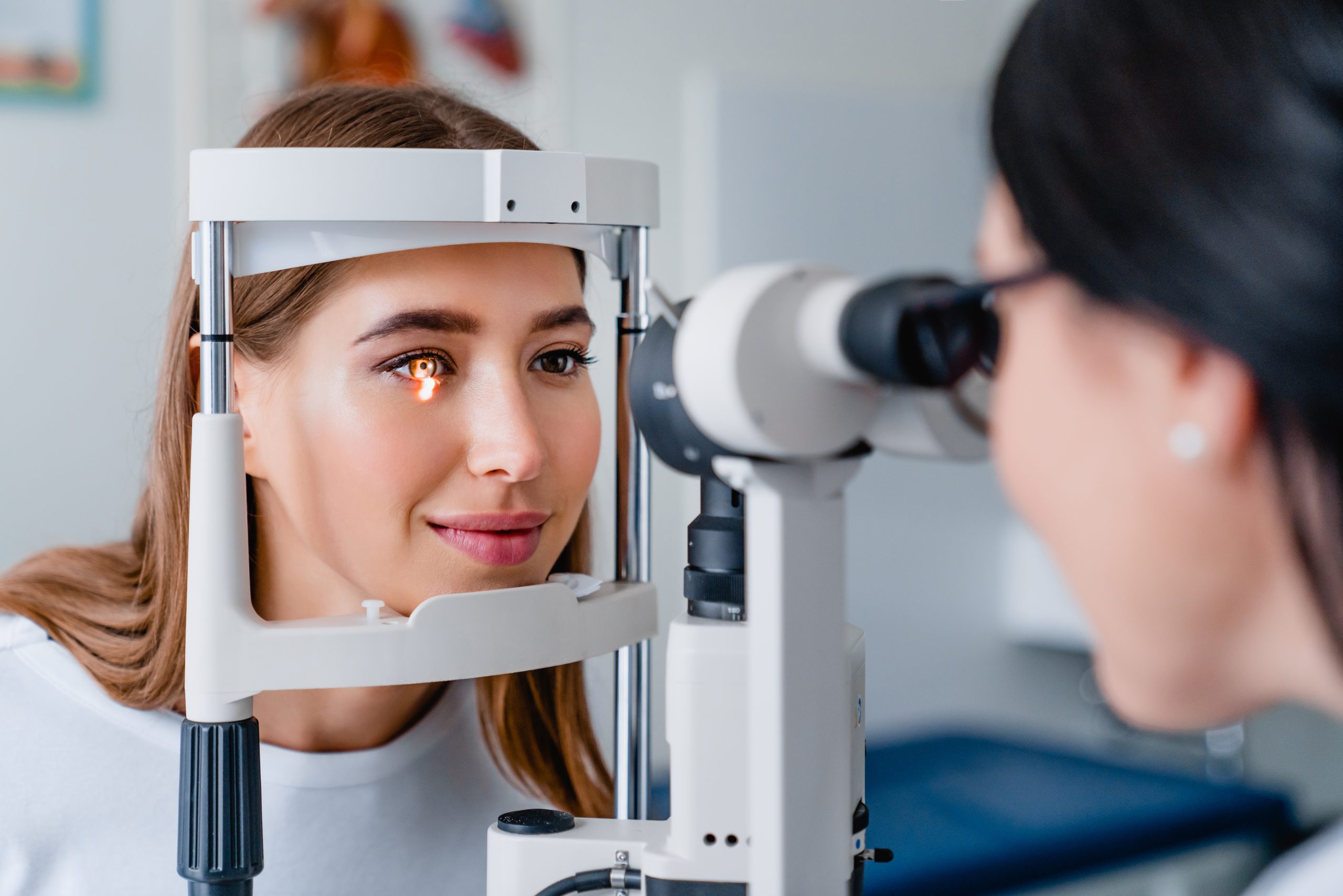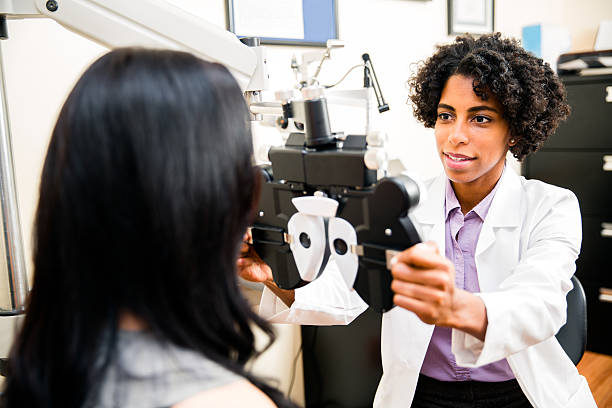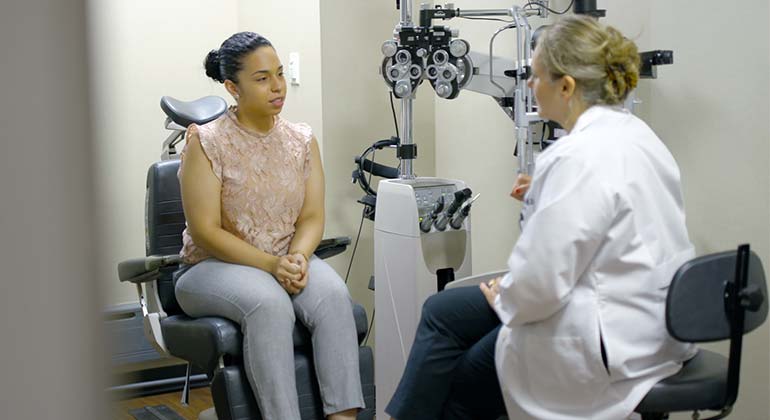Find an Optometrist Near Me for Your Eye Wellness
Exactly How an Optometrist Can Help Prevent and Manage Common Vision Problems Effectively
The role of an optometrist expands much beyond merely recommending glasses; it encompasses an extensive technique to preventing and managing numerous vision problems. Routine eye tests are vital for early discovery of problems like refractive errors and glaucoma, making it possible for timely interventions that can significantly enhance top quality of life. By establishing personalized treatment plans and offering advice on preventative treatment techniques, eye care experts make certain that people are equipped to maintain optimal eye health. However, the subtleties of their strategy and the current advancements in eye treatment may raise concerns concerning ideal methods and possible results.
Significance of Normal Eye Exams

Furthermore, regular eye exams can expose systemic health and wellness problems, consisting of diabetes and hypertension, as the eyes usually reflect changes in general wellness. Establishing a routine timetable for eye exams, usually every one to two years, permits for prompt treatments and can help protect vision.
People in certain age or with particular risk elements, such as a family members background of eye illness or chronic health and wellness problems, may take advantage of even more constant examinations. By prioritizing these visits, patients can ensure they get personalized care tailored to their special requirements. Eventually, normal eye exams play a critical function in both aggressive and preventative eye care, enabling individuals to maintain their high quality of life and visual function.
Early Detection of Vision Problems
Early detection of vision issues is critical for effective management and treatment, as prompt intervention can considerably reduce the development of eye conditions. Normal eye assessments act as a crucial tool in identifying prospective problems before they rise into more serious problems. Ophthalmologist make use of numerous analysis methods to evaluate aesthetic skill, eye alignment, and overall eye health, enabling them to discover irregularities at an onset.
Typical vision issues, such as refractive errors, cataracts, and glaucoma, might not offer noticeable symptoms initially. Therefore, regular screenings are essential for people of all ages, specifically those with a family members history of eye disorders or various other danger factors. Early identification allows for prompt recommendations to professionals and can bring about much better results, decreasing the likelihood of complications.
Moreover, advancements in innovation have improved the capability to diagnose problems early, thereby increasing the effectiveness of subsequent interventions. Individuals should be aggressive in scheduling normal appointments and communicating any type of modifications in their vision to their eye care company. By prioritizing early discovery, people can take substantial strides toward preserving their vision and preserving total eye wellness.
Personalized Therapy Plans
When vision issues are identified, the solution of customized treatment plans comes to be necessary to attend to the special requirements of each individual. Eye medical professionals utilize thorough assessments, including aesthetic acuity tests, refraction evaluations, and ocular health assessments, to collect essential info regarding a person's details problems. This data assists in developing targeted treatments that straighten with the person's way of life, preferences, and overall health and wellness condition.
Individualized therapy strategies visit homepage may integrate a variety of choices, including corrective lenses, drugs, or advanced therapies customized to details disorders such as glaucoma, macular degeneration, or diabetic retinopathy. Moreover, the inclusion of academic components is crucial, as people are notified about their problems and the reasoning behind the picked Related Site therapy techniques. This joint strategy cultivates a higher sense of ownership and adherence to the therapy program.
Furthermore, follow-up consultations are critical for keeping track of progress and making modifications as needed. By focusing on individualized therapy strategies, eye treatment experts can not just boost the effectiveness of interventions but also improve the general high quality of life for their patients, empowering them to handle their vision health and wellness proactively and efficiently.
Preventative Care Strategies
Preventative care methods play a critical duty in keeping optimum eye health and protecting against the start of vision problems. Normal eye examinations are essential, as they permit eye treatment specialists to find prospective issues early, also before signs and symptoms show. These examinations can determine refractive mistakes, cataracts, and glaucoma, enabling prompt treatment.
Along with regular appointments, embracing a healthy and balanced lifestyle significantly adds to eye wellness. A well balanced diet plan rich in vitamins A, C, E, and omega-3 fats can enhance aesthetic feature and minimize the threat of age-related macular degeneration. In addition, safeguarding the eyes from hazardous ultraviolet (UV) rays by using sunglasses with proper UV defense is crucial in protecting against conditions like cataracts.
Consistently engaging in physical task likewise advertises total health, including eye wellness. By executing these preventative treatment techniques, individuals can substantially improve their eye health and wellness and reduce the chance of establishing major vision troubles.

Function in Handling Chronic Issues
Taking care of chronic problems commonly needs a joint method, and optometrist why not try here play a vital duty in this process. Many systemic diseases, such as diabetic issues and high blood pressure, have significant eye effects that can impact vision. Ophthalmologist are vital in monitoring and taking care of these conditions, as they can discover early signs of difficulties that might not be noticeable to the patient or key care copyright.
As an example, diabetic retinopathy is an usual repercussion of unmanaged diabetic issues, and routine eye exams can help with very early treatment, protecting against severe vision loss. Ophthalmologist can also give tailored guidance relating to way of living adjustments and necessary medical recommendations to guarantee extensive client treatment.
Moreover, problems like autoimmune problems might manifest ocular symptoms, requiring an ophthalmologist's know-how in both vision care and the underlying systemic concerns. eye doctor. By functioning very closely with health care physicians and various other experts, ophthalmologist aid work with therapy methods that encompass both general and aesthetic health and wellness

Final Thought
In verdict, the function of an eye doctor is essential in avoiding and handling common vision troubles. With the application of preventative treatment strategies and diligent monitoring of persistent conditions, eye physicians contribute dramatically to the enhancement of overall vision wellness.
By establishing individualized treatment strategies and providing guidance on preventative treatment techniques, eye treatment professionals ensure that people are equipped to maintain optimum eye health.Routine eye exams are important for keeping optimal vision and overall eye health. Throughout an eye examination, an eye treatment professional assesses aesthetic acuity, assesses the health and wellness of the eyes, and may do examinations to inspect for problems such as glaucoma, cataracts, and macular degeneration.
Eye doctors use various diagnostic strategies to assess visual skill, eye placement, and general eye health, enabling them to identify abnormalities at a very early stage.
Routine eye evaluations are basic, as they permit eye care experts to identify prospective issues early, even before symptoms manifest. (eye doctor)